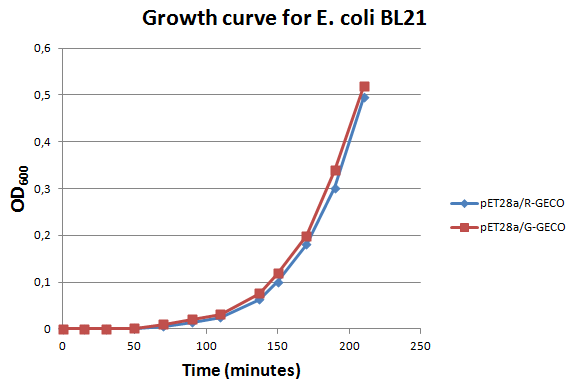Team:TU-Eindhoven/LEC/BioBricks
From 2012.igem.org
| Line 2: | Line 2: | ||
{{:Team:TU-Eindhoven/Templates/head|image=https://static.igem.org/mediawiki/2012/9/97/Ourbiobricks_ehv.jpg}} | {{:Team:TU-Eindhoven/Templates/head|image=https://static.igem.org/mediawiki/2012/9/97/Ourbiobricks_ehv.jpg}} | ||
<groupparts>iGEM012 TU-Eindhoven</groupparts> | <groupparts>iGEM012 TU-Eindhoven</groupparts> | ||
| - | <p>Our iGEM team prepared three different BioBricks: BBa_K881000 (R-GECO), BBa_K881001 (G-GECO), BBa_K881002 (B-GECO). These three GECO proteins, which are obtained from ''Zhao et al. 2011''<html><a href="#ref_zhao" name="text_zhao"><sup>[1]</sup></a></html>, are red, green and blue fluorescent respectively. The coding DNA for these three proteins was ligated into a <partinfo>pSB1C3</partinfo> vector. | + | <p>Our iGEM team prepared three different BioBricks: BBa_K881000 (R-GECO), BBa_K881001 (G-GECO), BBa_K881002 (B-GECO). These three GECO proteins, which are obtained from ''Zhao et al. 2011''<html><a href="#ref_zhao" name="text_zhao"><sup>[1]</sup></a></html>, are red, green and blue fluorescent respectively. The coding DNA for these three proteins was ligated into a <partinfo>pSB1C3</partinfo> vector. After culturing, the vectors were restricted with restriction enzymes XbaI en PstI. These enzymes restricted the vector nicely, however, the DNA sequence coding for the fluorescent GECO proteins appears to contain a restriction site for PstI aswell. Therefore, this procedure was repeated with restriction enzymes XbaI and SpeI. |
Revision as of 20:42, 25 September 2012

Our iGEM team prepared three different BioBricks: BBa_K881000 (R-GECO), BBa_K881001 (G-GECO), BBa_K881002 (B-GECO). These three GECO proteins, which are obtained from Zhao et al. 2011[1], are red, green and blue fluorescent respectively. The coding DNA for these three proteins was ligated into a <partinfo>pSB1C3</partinfo> vector. After culturing, the vectors were restricted with restriction enzymes XbaI en PstI. These enzymes restricted the vector nicely, however, the DNA sequence coding for the fluorescent GECO proteins appears to contain a restriction site for PstI aswell. Therefore, this procedure was repeated with restriction enzymes XbaI and SpeI. The GECO’s, R-GECO (red), G-GECO (green) and B-GECO (blue) are the biobricks we will send to the registry. Those biobricks can be used in yeast and in E.coli cells. The protocol attached with the biobrick-library didn’t work for us. We used our own restriction and ligation protocols to develop the biobrick.
The permission we needed to add the GECO’s to registry library was not easy to get. You can read more about this struggle at the Considerations-page.

Characterization
E. Coli strain BL21 transformed with Part BBa_K881000 and Part BBa_K881001 ligated into vector pET_28a were cultured in LB media containing 100 µg/ml kanamycin for ~4 hours at 37°C. The growth rate was followed by use of OD600 measurements (see figure on the right). Then the culture was induced at an OD600 of 0,82 absorption units with 100 µg/ml IPTG.
Harvesting and Purification
After induction for 15 hours, the cells were harvested and lysed with 5ml BugBuster containing 1µl/ml Benzonase. The supernatant of this suspension was put on a Ni-NTA column for purification and afterwards put on a PD10 column and washed with a TRIS buffer containing NaCl to remove all the calcium molecules. Then, an SDS-gel was prepared to check the purity of the GECO proteins (See figure below).
Calcium titration
References
- [1] Zhao, Y. et al. ''An Expanded Palette of Genetically Encoded Ca2+ Indicators'' in ''Science'' 30 September 2011, Vol. 333 no. 6051 pp. 1888-1891, DOI: 10.1126/science.1208592)
 "
"